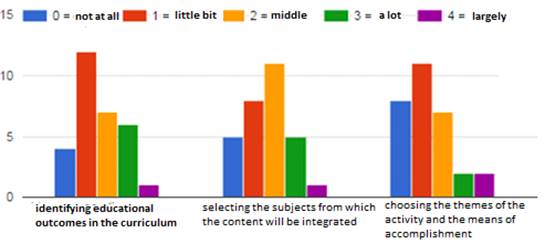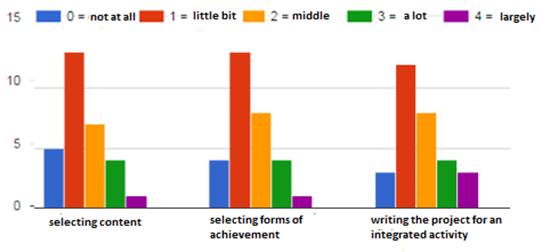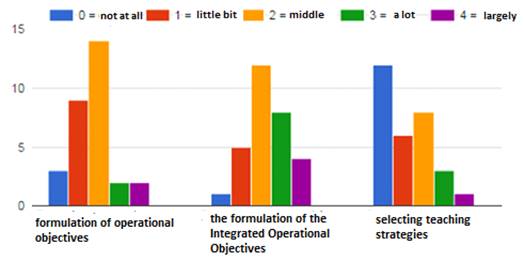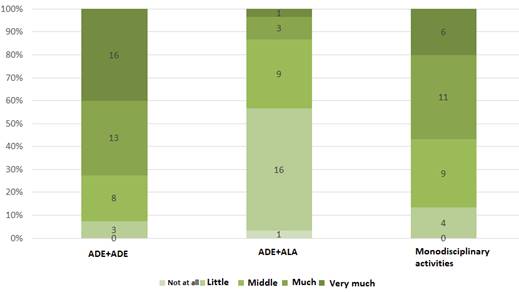Abstract
The basis of the ”A Study on integrated activities in kindergarten using integrative operational objectives” lies in the didactic experience of the author, the systematic reflections on the didactics of integrated activities performed in kindergarten, the theoretical information and the data gathered from the teaching apprenticeship, as well as the implementation of pedagogical investigations. The paper argues and proposes an original practical solution in support of the idea that setting the educational objectives is a complex endeavour, which requires the consideration of concrete educational conditions (educational needs, objective and subjective factors, educational resources, etc.). Based on the strictly theoretical analyses regarding the axiological problem and dimension of education, oriented specifically on the pre-school education level, practical investigations were carried-out, through a questionnaire-based survey, in order to study the perceptions and opinions of the teaching staff in relation to the integrated activities oriented towards the integrative operational objectives (i.o.o). In the process of formulating the educational objectives, it is necessary to move from the mere application of rigid taxonomies to the incorporation of the objectives in the design of the educational process. This study proposes to overcome the level of strictly theoretical analyses and to carry-out practical investigations in order to study the perceptions and opinions of the teaching staff in relation to the integrative activities oriented towards use of integrative operational objectives (i.o.o.), by applying a questionnaire survey (as an extensive research method), thus contributing to the rehabilitation of teaching experience as a source of improvement and pedagogical research.
Keywords: Integrative operational objectives (ioo)integrated activitiesnovice kindergarten teachers
Introduction
The paradigm shift in the theory of curriculum regarding the reversal of the roles of educational content and educational outcomes, and the consideration of the outcomes of education as the main vector of the system, has generated new approaches and priorities in the theory and practice of education. Implicitly, this change has led to the identification of theoretical-fundamental and practical-applicative topics of research that support the different professional categories in their specific approaches: educational decision-makers, curriculum designers, researchers and practitioners. One such theme could be strategies of effectively formulating the educational outcomes so as to fulfil their role as an axiological reference point for the educational activities (Bocoş & Jucan, 2019).
The educational actions, regardless of complexity and extension over time, need to be oriented towards educational outcomes of varying degrees of complexity. The existence of educational goals that guide, structure and organize educational actions, ensure their efficiency and provide important milestones for their adjustment. The most concrete and operational ones refer to the expected behaviours from those who are educated, during and at the end of the educational activity (Ionescu, 2011; Chiş, 2014). In our opinion, introducing and operating with the integrative operational objectives represents the means of ensuring a teleological coherence of the educational activities, as, this category of objectives guides, adjusts, directs while regulating any educational activity and proceeding (Bocoș, Răduţ-Taciu, Stan, Chiş, & Andronache, 2016).
If an integrated activity requires the combination of content from different subjects / fields, then the integrative operational objectives, as a general objective of the integrated activity, needs to "incorporate" the operational objectives pursued in the blended subjects / fields, so as to be able to explain the level / area of incorporation of the teaching-learning sequences / activities, that are to be transmitted, processed and assimilated throughout the course (Bocoş, Răduţ-Taciu, & Stan, 2018).
Integrative operational objectives coexist with the operational objectives used so far in the planning of didactic activities, they do not replace them, but complement them in the area that reflects the level of integration of content in the projected and executed integrated activity. In other words, the formulation and use of integrative operational objectives respects the systemic vision of kindergarten didactic activities, the systemic connections and the reciprocal interrelations that exist between the teaching components of these activities and, of course, the interdependencies between them.
In our Study, we aim at identifying the problems of planning and implementing integrated activities, respectively, the strategies of formulating the integrative operational objectives by the novice kindergarten teachers, in order to improve the mentorship program conducted by the teams established in Sălaj County. The theoretical and practical research of these objectives will be achieved through the valorisation of the meanings and the content of the objectives, while considering the particularities of the pre-school education, and by taking into account the relations between the behavioural and non-behavioural in the description of the pre-school children’s manifestations.
Problem Statement
Investigation of the usefulness of the formulation of the integrative operational objective by the novice kindergarten teachers within the integrated activities carried out in the kindergarten.
Research Questions
What are the difficulties encountered by novice kindergarten teachers in designing integrated teaching activities?
Is it perceived as necessary to formulate the integrative operational objectives for integrated activities?
What are the difficulties faced by novice kindergarten teachers in formulating the integrative operational objectives?
What are the needs of novice kindergarten teachers to improve the planning and development of integrated activities?
Purpose of the Study
A study the perceptions and opinions of the teaching staff working in kindergartens in relation to the integrative activities oriented towards use of integrative operational objectives (i.o.o.).
Research Methods
The data were collected through the survey method based on a questionnaire with 18 questions, of which 4 open questions, 5 questions on a Likert scale and 9 multiple answers questions, made in Google Forms on Google Drive and applied between 19.04 - 24.04.2017 to a number of 30 novice kindergarten teachers from Sălaj County, from the list of apprenticeship teams set up at Sălaj County School Inspectorate. The collected data has been statistically processed and represented in charts using the Excel spreadsheet editor.
The questionnaire is available at: https://docs.google.com/forms/d/1HobyGqx4EJRIPIyw4TIgZzDixxOAOBpppFOVgP62Lic/edit
Findings
Of the 30 kindergarten teachers questioned, 67% work in kindergartens located in rural areas and 33% in urban areas; 93% of them benefited from professional guidance from the teams set up at county level; 86% perceive as beneficial the mentoring activity they benefited from. As it can be observed in Table
A number of issues have been approached in the meetings of the mentoring teams with the novice teachers. The responses that the teachers have provided include a wide range of discussed issues, the most common being:
Integrated activities
Formulating the objectives/ the integrative operational objectives
Planning (annual, semester, weekly, experimental domains, subjects)
Completing the school activity log book
Designing the didactic activity.
At the requirement that stems from the curricular recommendations at county level, to design/ project at least 2 integrated activities per week, regardless of the teachers' experience or the age of the children, it is found that 87% of the novice teachers plan 1-2 integrated activities per week, only 13% plan 3-4 integrated activities per week, and no teachers plan over 4 integrated activities per week. Novice kindergarten teachers state that, from the integrated activities in a week (1-2), 70% integrate subjects from two experiential areas, 17% integrate subjects from a freely chosen volunteer field, and 13% plan, in relatively equal numbers, the aforementioned activities.
When questioning the difficulties encountered in designing integrated activities, the answers of the educators were quantified on a five-step scale, as it can be observed on the chart below, respectively: Figure



As regards the extent to which the teachers integrate the categories of activities from the curriculum, the data is as follows in Figure

In view of the answers given to the questions above, the question arises ”Is there the possibility that some novice teachers write down a number of integrated activities in the official documents, and in reality they perform their activities on subjects?”
The following three questions from the questionnaire refer to the innovation in planning integrated activities, the integrative operational objective, by reference to the following analysis criteria: the frequency of its formulation in the daily design of integrated activities (Figure



From the answers received, we can conclude that:
60% define the objective for each / most integrated activities, and 43% need a better understanding of it, to use it in lesson planning.
percentages show that defining the integrative operational objective is perceived as useful for the planning of integrated activities: the greatest benefits of defining the integrative operational objective are associated with the evaluation of the activity (60%), the drafting of the didactic tasks (53.33%) and the integration of the contents (46, 66), less with the choice of didactic strategies (27%).
70% of novice kindergarten teachers consider that they should be used in the lesson planning, and 27% are sceptical and think that a research on the impact of this innovation on planning integrated activities should precede its use, a single teacher (3.3%) considers that they should not be used in lesson planning at all.
The last two questions of the questionnaire refer to aspects related to the needs of the novice teachers’s training, regarding those aspects that would improve the planning process of the integrated activities carried out with children in kindergarten, respectively of the teaching-learning-assessment process.
At the question with predefined answers, regarding the needs of novice kindergarten teachers to improve the planning and development of integrated didactic activities (Table
The last question in the questionnaire asks the respondents to fill-in the previously predefined list some specific additional needs in relation with the integrated activities, and Table
Conclusion
After presenting the results of the study, we can highlight the following:
The guidance of the novice kindergarten teachers by the teams established at the county level is perceived as beneficial by them, the direct meetings are desirable, but the indirect ones are also appreciated, especially since the distance between the home/ town in which the teachers perform their activity and the place where the mentor works can be a problem for some of them.
The themes / issues addressed during the meetings with the mentoring teams have been varied, but a large part of them have remained insufficiently well-clarified, showing the difficulties that persist in the planning and execution of integrated didactic activities.
Even though they do not master very well the concepts of planning and conducting integrated activities, the novice teachers affirm that they plan and run, on a weekly basis, at least 1-2 integrated didactic activities
The choice of integrating subjects from different experiential areas can be based on the fact that it is closer to the planning of self-contained subjects.
The integrative operational objective is perceived as useful in planning and executing integrated activities (only 3% think it should not be used at all), the benefits are seen in relation to all aspects of planning, but especially in relation to the assessment of pre-school children and the conception of didactic tasks.
There is a need for a better explanation of how to express the integrative operational objective and investigate its impact on the planning before it is used in practice.
Novice teachers want to improve their didactic activity, mentors, training courses, individual study of teaching books being highly appreciated in this respect.
The inclusion in the training courses addressed to the teachers, of a sequence explaining the conception of the integrative operational objective.
Workshops to discuss the theoretical and practical issues of integrative operational objectives.
References
- Bocoş, M., & Jucan, D. (2019). Fundamentele pedagogiei. Teoria şi metodologia curriculumului. Repere şi instrumente didactice pentru formarea profesorilor. Piteşti: Editura Paralela 45.
- Bocoş, M.-D., Răduţ-Taciu, R., & Stan, C. (2018). Dicţionar Praxiologic de Pedagogie. Volumul IV: M-O. Piteşti: Editura Cartea Românească Educaţional.
- Bocoş, M.-D., Răduţ-Taciu, R., Stan, C., Chiş, O., & Andronache, D.-C. (2016). Dicţionar Praxiologic de Pedagogie. Volumul I: A-D. Piteşti: Editura Paralela 45.
- Chiş, V. (2014). Fundamentele pedagogiei. Repere tematice pentru studenţi şi profesori/ Fundamentals of Pedagogy. Thematic highlights for students and teachers. Cluj-Napoca: Editura Eikon.
- Ionescu, M. (2011), Instrucţie şi educaţie. Paradigme educaţionale moderne, ediţia a IV-a revizuită şi adăugită. Cluj-Napoca: Editura Eikon.
Copyright information

This work is licensed under a Creative Commons Attribution-NonCommercial-NoDerivatives 4.0 International License.
About this article
Publication Date
17 June 2020
Article Doi
eBook ISBN
978-1-80296-084-6
Publisher
European Publisher
Volume
85
Print ISBN (optional)
-
Edition Number
1st Edition
Pages
1-814
Subjects
Teacher, teacher training, teaching skills, teaching techniques, special education, children with special needs
Cite this article as:
Clapa (Souca), V., & Bocoş, M. (2020). A Study On Integrated Activities In Kindergarten Using Integrative Operational Objectives. In V. Chis (Ed.), Education, Reflection, Development – ERD 2019, vol 85. European Proceedings of Social and Behavioural Sciences (pp. 10-18). European Publisher. https://doi.org/10.15405/epsbs.2020.06.2
